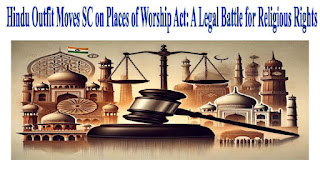Supreme Court to Hear Places of Worship Act Case in April: A Detailed Analysis
.jpg)
Supreme Court to Hear Places of Worship Act Case in April: A Detailed Analysis Introduction The Supreme Court of India has scheduled the hearing of multiple petitions challenging the Places of Worship (Special Provisions) Act, 1991 for the first week of April. The Act, which maintains the religious character of places of worship as they stood on August 15, 1947 , is under legal scrutiny for allegedly violating constitutional principles. Supreme Court’s Observations on the Case On February 12, a bench headed by Chief Justice of India (CJI) Sanjiv Khanna and Justice P.V. Sanjay Kumar adjourned the hearing, noting that the case requires a three-judge bench . CJI Khanna also highlighted the increasing number of intervention applications and writ petitions related to the Act. 🔹 The court clarified that while fresh petitions would stand dismissed , new grounds could be raised in the pending matters through intervention applications. Who Filed Petitions Against the Act? Several Hind...
.jpg)

